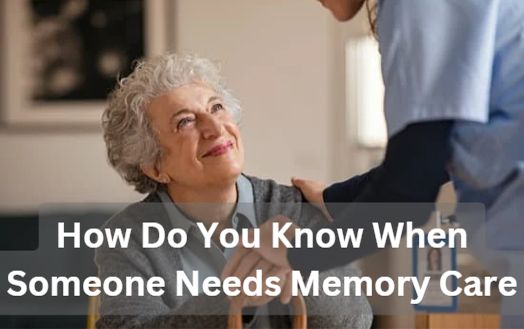As loved ones age and face various cognitive challenges, you may wonder when it’s time to consider memory care options. Memory care provides specialized support for those experiencing memory difficulties, such as Alzheimer’s disease or dementia, and focuses on maintaining mental function, ensuring safety, and improving quality of life. Recognizing the warning signs that someone needs memory care can be challenging, but there are key indicators to look for to help make this important decision.
Changes in behavior, confusion and disorientation that imperil physical safety, and a decline in the ability to perform daily activities are all potential signs that memory care may be necessary. Additionally, problems with personal hygiene, mistakes with medications, missed doctor appointments, and wandering are other indicators that it might be time to seek specialized attention. Understanding these signs and being proactive in seeking appropriate care can greatly impact the wellbeing of your loved one facing memory challenges. Read this article if you got this question in mind, “How do you know when someone needs memory care?”
Warning Signs of Memory Issues
Cognitive Decline
One of the key indicators that someone may need memory care is a decline in cognitive abilities. This could manifest as difficulties with tasks that were once simple, increased forgetfulness, or disorientation in familiar surroundings. In some cases, it may be unclear if the decline is due to normal aging or a more serious issue like dementia or Alzheimer’s.
Mood And Behavior Changes
Significant changes in mood or behavior can also signal that a person may need memory care assistance. These changes may include increased irritability, anxiety, depression, or unusual emotional reactions to situations.
Physical Struggles
Physical difficulties, such as trouble with coordination, balance, or motor skills, can also indicate a need for memory care. Moreover, individuals may have trouble with personal hygiene or maintaining a clean living space.
Social Withdrawal
If a person begins to withdraw from social situations, it could be a sign that they are struggling with memory issues. They might avoid interacting with others, become disinterested in previously enjoyed activities, or isolate themselves from friends and family.
Safety Concerns
A crucial warning sign that someone might need memory care is when there are safety concerns related to their memory issues. For example, they may leave appliances on, forget to lock doors, get lost in familiar locations, or have difficulty managing medications. These situations can put the individual and others at risk and may necessitate memory care intervention.
Different Memory Care Options

There are various memory care options for individuals experiencing cognitive decline. It’s essential to consider each option carefully and choose the one that best suits the person’s needs and circumstances. This section compares three common memory care options: In-Home Care, Assisted Living Facilities, and Memory Care Units.
In-Home Care
In-home care allows the person with dementia to remain in their familiar environment while receiving the necessary assistance. Caregivers come to the person’s home to help with daily activities, medication management, and companionship. In-home care can be tailored to the individual’s needs, managing various tasks such as:
- Personal care and hygiene
- Meal preparation
- Housekeeping and laundry
- Transportation to appointments
In-home care may be suitable for those in the early stages of dementia who prefer to maintain some independence and familiarity.
Assisted Living Facilities
Assisted Living Facilities provide a residential setting for seniors who require some assistance with daily activities but do not need intensive medical care. These facilities typically offer:
- Personal care and support services
- 24-hour supervision
- Meals and nutrition assistance
- Medication management
- Social and recreational activities
Assisted living communities may have specialized memory care units or programs to accommodate residents with cognitive decline.
Memory Care Units
Memory Care Units provide specialized care for people with dementia in a secure environment. These units are often located within assisted living facilities or nursing homes, and provide dedicated care and activities tailored to residents with cognitive decline. The key features of memory care units include:
- 24-hour supervision and care
- Specially trained staff
- Structured daily activities designed for cognitive stimulation
- Secured premises to prevent wandering
A Memory Care Unit can be an ideal option for those in the later stages of dementia when specialized care and a secure environment become necessary.
Consulting Professionals

How do you know when someone needs memory care? When determining if someone needs memory care, it is essential to consult with professionals who specialize in memory and cognitive disorders. In this section, we will explore three types of specialists to consult: Primary Care Physician, Geriatric Specialist, and Neuropsychologist.
Primary Care Physician
Your loved one’s primary care physician should be your first point of contact when evaluating the need for memory care. They have an established relationship with the patient and can assess their cognitive function through regular checkups and history.
Primary care physicians can provide referrals to other specialists if they identify signs of dementia or other cognitive impairments. Keeping them informed of any observed behavior changes helps ensure proper evaluation and intervention.
Geriatric Specialist
A geriatric specialist focuses on the medical and health needs of older adults. Their expertise in aging-related conditions, such as Alzheimer’s, dementia, and other cognitive disorders, makes them uniquely qualified to assess cognitive decline and determine the need for memory care.
Geriatric specialists can offer tailored treatment plans and make recommendations for memory care facilities or in-home assistance, providing invaluable support and guidance during this challenging time.
Neuropsychologist
Consulting a neuropsychologist helps gain a more comprehensive understanding of your loved one’s cognitive function. Neuropsychologists specialize in analyzing the relationship between brain function and behavior, which can lead to a more accurate assessment of cognitive decline.
They perform detailed evaluations, including assessments of memory, language, attention, and problem-solving abilities. Neuropsychologists can provide valuable insight into the type and severity of cognitive impairment, as well as recommendations for appropriate memory care options.
Support for Caregivers and Families

Caring for a loved one with dementia or memory issues can be challenging and emotionally taxing. It’s essential to have access to support and resources for both caregivers and the family members involved. This section highlights available resources, such as educational materials, support groups, and online communities, which can help make the caregiving journey more manageable.
Educational Resources
Educational materials can provide valuable information on understanding dementia and learning how to better care for someone affected by the condition. These resources range from literature on dementia to practical tips for caregivers. It’s essential to stay informed about the progression of dementia and the strategies that can assist in coping with the disease. Alzheimer’s.gov is a valuable resource for caregivers and families of people with dementia, where they can learn about their loved one’s condition and plan for their future needs.
Support Groups
Joining support groups can provide emotional and social support for caregivers and family members. These groups typically consist of individuals who share similar experiences and can offer insights, encouragement, and advice. Local support groups can be found through hospitals, community centers, and organizations specializing in dementia care.
Online Communities
Online communities can provide additional support to caregivers and families, as well as offer further resources, advice, and connections. These digital platforms can offer access to forums, articles, and webinars that address various aspects of dementia care. They can also provide a platform to connect with other caregivers and families in similar situations through chats and discussions. Some notable online communities catering to dementia care include the Alzheimer’s.net community and the ALZConnected forum by the Alzheimer’s Association.
Conclusion
In conclusion, knowing when someone needs memory care is crucial for ensuring they receive the appropriate support and attention for their well-being. Keep an eye out for various warning signs, such as increased confusion, disorientation, behavioral changes, or safety concerns.
It is essential to remember that people with dementia can still enjoy life, and they deserve kindness and understanding from their caregivers. Acknowledging the limitations of home care and considering professional memory care services can enhance the quality of life for both the individual and their families.
Ultimately, the decision to transition to memory care should be made in the best interest of the individual, taking into account their specific needs and preferences. By recognizing the signs and acting accordingly, you can ensure that your loved one receives the care and support they need in their journey with dementia. These are the guidelines if you want answers to the question, “How do you know when someone needs memory care?”

